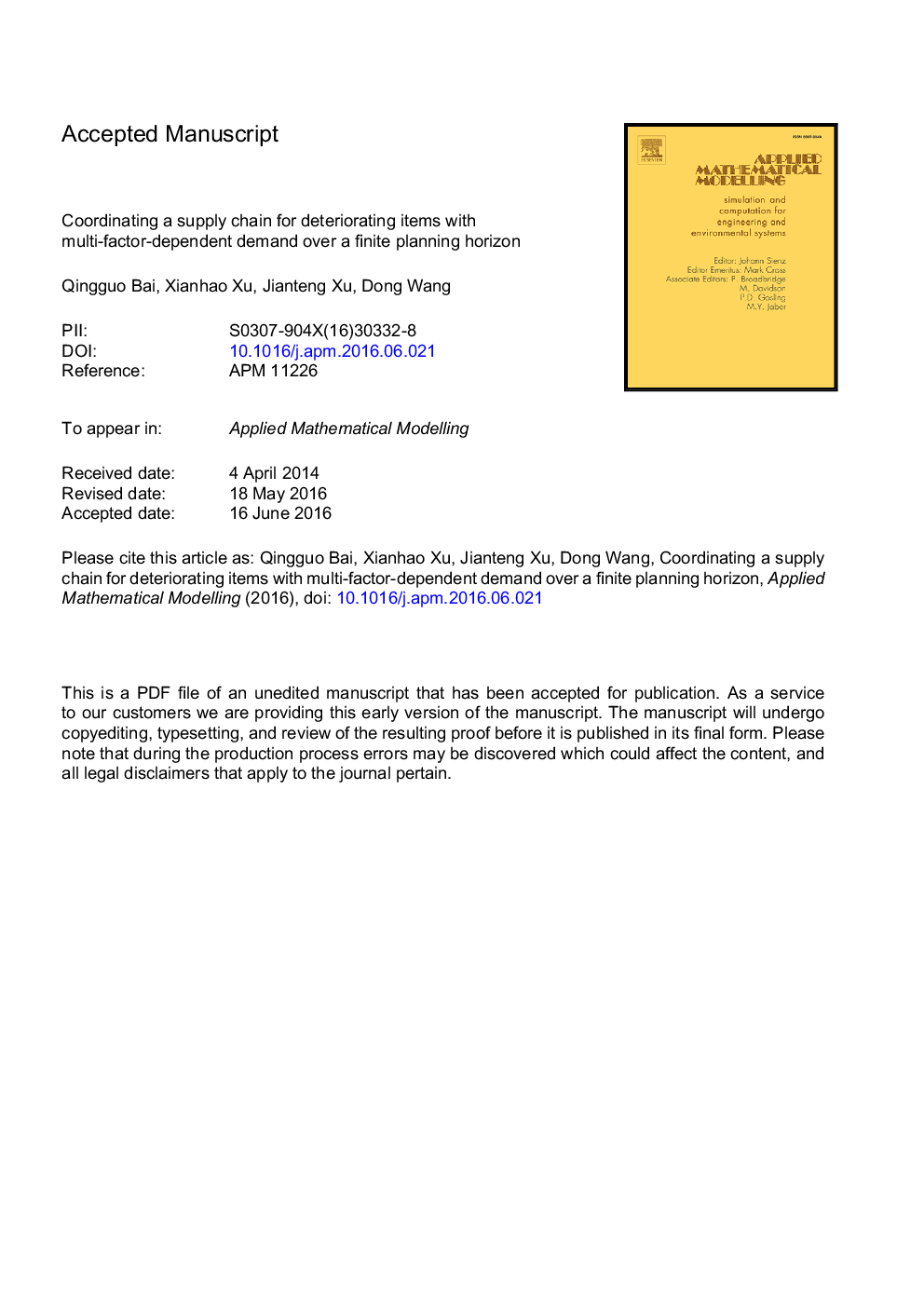| کد مقاله | کد نشریه | سال انتشار | مقاله انگلیسی | نسخه تمام متن |
|---|---|---|---|---|
| 5471476 | 1519394 | 2016 | 26 صفحه PDF | دانلود رایگان |
عنوان انگلیسی مقاله ISI
Coordinating a supply chain for deteriorating items with multi-factor-dependent demand over a finite planning horizon
ترجمه فارسی عنوان
هماهنگ سازی یک زنجیره عرضه برای خراب شدن اقلام با تقاضای وابسته به چند عامل در یک افق برنامه ریزی محدود
دانلود مقاله + سفارش ترجمه
دانلود مقاله ISI انگلیسی
رایگان برای ایرانیان
کلمات کلیدی
ترجمه چکیده
این مطالعه یک زنجیره تامین یک تولید کننده و یک خرده فروش را برای خراب شدن اقلام در یک افق برنامه ریزی محدود می داند. در مورد تقاضای وابسته به چند عامل، ما هماهنگی سیستم را در یک مکانیسم قرارداد بررسی می کنیم. اول، ما یک مدل غیر متمرکز و یک مدل متمرکز را با هم مقایسه می کنیم. بعدا، ما یک قرارداد اشتراک درآمد و یک قرارداد تجدیدنظر به اشتراک درآمد پیشنهاد میکنیم تا زنجیره تأمین غیر متمرکز را هماهنگ کنیم. ما الگوهای پیشنهادی را با مثال عددی نشان می دهیم و تجزیه و تحلیل حساسیت نتایج هماهنگی را بر اساس چندین پارامتر کلیدی انجام می دهیم. نتایج نشان می دهد که سود خالص زنجیره ای در سیستم متمرکز با حداقل 13 افزایش می یابد، در حالی که هر دو قرارداد می توانند سیستم را هماهنگ کرده و پارامتر کسری درآمد وجود داشته باشد، زمانی که هر قرارداد برای هر دو عضو زنجیره تامین قابل قبول است و درآمد تجدیدشده قرارداد به اشتراک گذاشتن همیشه سود بالاتری نسبت به قرارداد به اشتراک درآمد دارد. علاوه بر این، سود خالص زنجیره ای تحت قرارداد تجدید نظر درآمدی نشان می دهد که معادل آن با سیستم متمرکز است.
موضوعات مرتبط
مهندسی و علوم پایه
سایر رشته های مهندسی
مکانیک محاسباتی
چکیده انگلیسی
This study considers a one-manufacturer and one-retailer supply chain for deteriorating items over a finite planning horizon. In the case with multi-factor-dependent demand, we analyze the coordination of the system within a contract mechanism. First, we formulate and then compare a decentralized model and a centralized model. Next, we propose a revenue-sharing contract and a revised revenue-sharing contract to coordinate the decentralized supply chain. We illustrate the proposed models with a numerical example and we perform sensitivity analysis of the coordination results based on several key parameters. The results show that the supply chain's profit in the centralized system increases by at least 13, where both contracts can coordinate the system and the fraction parameter of the revenue exists when each contract is acceptable to both members of the supply chain, and the revised revenue-sharing contract always yields a higher profit than the revenue-sharing contract. Furthermore, the supply chain's profit under the revised revenue-sharing contract is shown to be equivalent to that with the centralized system.
ناشر
Database: Elsevier - ScienceDirect (ساینس دایرکت)
Journal: Applied Mathematical Modelling - Volume 40, Issues 21â22, November 2016, Pages 9342-9361
Journal: Applied Mathematical Modelling - Volume 40, Issues 21â22, November 2016, Pages 9342-9361
نویسندگان
Qingguo Bai, Xianhao Xu, Jianteng Xu, Dong Wang,
